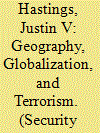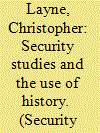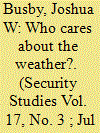|
|
|
Sort Order |
|
|
|
Items / Page
|
|
|
|
|
|
|
| Srl | Item |
| 1 |
ID:
084570


|
|
|
|
|
| Publication |
2008.
|
| Summary/Abstract |
How do ordinary people come to commit genocide against their neighbors? Ethnicity-based approaches cannot explain the different pathways that lead to mass violence or the different forms that participation takes over time and place. In Rwanda, different processes and mechanisms led some to join in the carnage while others resisted. Utilizing Mark Granovetter's concept of “social embeddedness,” this article argues that social ties and immediate social context better explain the processes through which ordinary people came to commit mass murder in Rwanda. Leaders used family ties to target male relatives for recruitment into the killing groups, which were responsible for carrying out the genocide. Ties among members of the killing groups helped to initiate reluctant or hesitant members into committing violence with the group. Finally, ties of friendship attenuated murderous actions, leading killers to help save Tutsi in specific contexts. Which ties became salient depended on the context. In the presence of the killing group or authority(ies), low-level participants (a group I call “Joiners”) tended to go along with the violence. Alone, Joiners often made different choices. The findings in this article are based on data collected during nine months of fieldwork in two rural communities and two central prisons in Rwanda.
|
|
|
|
|
|
|
|
|
|
|
|
|
|
|
|
| 2 |
ID:
084573


|
|
|
| 3 |
ID:
084568


|
|
|
|
|
| Publication |
2008.
|
| Summary/Abstract |
Great powers can pursue deliberate Trojan horse policies to transform rising and threatening states into followers and supporters rather than challengers by altering their domestic political and economic institutions. I contend that a great power can use trade concessions, rather than punishment, to enable a favorable foreign policy coalition in a target country. The intent is to strengthen the political power of state and societal elites who have a stake in deepening international ties, while opponents of such policies will be weakened politically and economically. The societal winners will then apply pressure on the government to support their preferred outward-oriented grand strategy. I term this process the second face of security since it entails a less direct and more nuanced method of creating security. I examine Britain's commercial policies toward Germany and Japan during the 1930s to better understand second-face strategies. I argue that the intent of Britain's industrial and commercial policy was to strengthen conservative business, government officials, and economic circles in banking, light industry, and finished goods, and even heavy industry in order to steer Berlin and Tokyo away from rearmament, extreme autarky, and war
|
|
|
|
|
|
|
|
|
|
|
|
|
|
|
|
| 4 |
ID:
084567


|
|
|
|
|
| Publication |
2008.
|
| Summary/Abstract |
In The Gathering Storm, Winston S. Churchill claimed that during the 1930s British leaders were willfully blind to the German threat and failed to meet it by rearming. Accepting the Churchillian narrative, leading IR scholars regard British grand strategy during the 1930s as glaring example of strategic adjustment failure. This article reappraises British grand strategy during the 1930s and rejects both the Churchillian narrative, and the scholarly claims that Britain did not adjust its strategy to the German threat. In the 1930s, Britain did balance against Germany and focused on countering what policy makers perceived as the key threat facing Britain: its vulnerability to German air attack. Britain's grand strategic options were limited by external conditions and by domestic economic constraints. Neville Chamberlain, therefore, was playing a weak hand, and did the best that he could with the cards he was dealt. Britain's 1930s grand strategy is one of the historical cases most frequently used by IR scholars for theory testing. For that reason alone, it is important to get the history right. This is not the only reason, however. The 1930s have provided many of the concepts, images, and metaphors that have dominated the discourse about American foreign policy since World War II. Because scholarship about the events of the 1930s shapes the discourse about real-world policy, getting the history right matters
|
|
|
|
|
|
|
|
|
|
|
|
|
|
|
|
| 5 |
ID:
084571


|
|
|
| 6 |
ID:
084569


|
|
|
|
|
| Publication |
2008.
|
| Summary/Abstract |
Is climate change a national security threat to the United States? This question remains a subject of debate in academia and has received renewed emphasis in the policy community. Even taking a narrow definition of national security, climate change already constitutes a national security threat to the United States, both in terms of direct threats to the country as well as its broader extraterritorial interests. While some of these purported threats-abrupt climate change and sea-level rise-have been overstated by advocates, several concerns, mostly related to the effects of extreme weather events on the United States and its strategic interests overseas, are sufficient enough that they already constitute security threats. That climate change potentially poses a direct threat to the U.S. homeland and its overseas interests suggests the subject warrants serious attention.
|
|
|
|
|
|
|
|
|
|
|
|
|
|
|
|
|
|
|
|
|